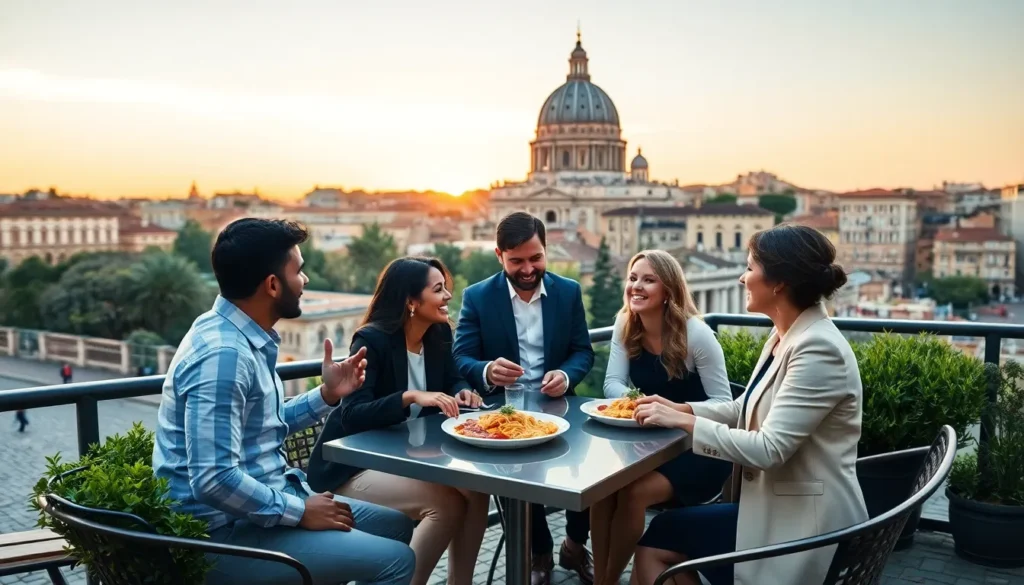Cultural habits shape the way people live, laugh, and connect across the globe. From quirky traditions that leave you scratching your head to hearty customs that bring communities together, these habits are the colorful threads weaving the rich tapestry of human experience. Ever wondered why some cultures greet with a bow while others opt for a bear hug?
Table of Contents
ToggleUnderstanding Cultural Habits
Cultural habits shape interactions across societies. These behaviors reflect the values and beliefs prevalent in local communities.
Definition of Cultural Habits
Cultural habits encompass the shared practices, rituals, and behaviors that characterize a group. They manifest through language, traditions, and social customs. Each culture may feature specific greetings, dining etiquette, and ways of celebrating important events. For instance, handshake greetings occur frequently in Western cultures, while some Asian cultures may prefer bowing as a sign of respect. Understanding these habits clarifies cultural identity and promotes appreciation for diversity.
Importance of Cultural Habits
Cultural habits play a crucial role in fostering connection and community. They create bonds by establishing common ground among individuals. Rituals and shared practices reinforce a sense of belonging. Furthermore, engaging with these habits encourages empathy and intercultural dialogue. Societies enriched with diverse cultural habits can enhance creativity and innovation. Recognizing their significance allows for better collaboration in an increasingly globalized world.
Types of Cultural Habits

Cultural habits encompass various social behaviors and practices. They shape interactions in distinct and meaningful ways.
Social Customs
Social customs involve formal and informal interactions among individuals. These practices range from greetings to celebrations. Many cultures prioritize interpersonal connections through shared rituals. For example, offering a warm welcome, like inviting guests with drinks or snacks, showcases hospitality in different regions. In some countries, specific gestures signify respect or friendship, such as bowing in Japan or cheek kissing in France. Observing local customs creates opportunities to build relationships and enhances understanding. These social norms reflect values held within communities, fostering unity and identity.
Food Traditions
Food traditions play a crucial role in cultural habits. They encompass meal preparation, dining rituals, and food-related celebrations. Many cultures have distinct culinary practices like communal gatherings or elaborate feasts during festivals. For instance, Thanksgiving in the United States emphasizes gratitude and family unity over a shared meal. Food also highlights regional ingredients and cooking techniques, reflecting local history and resources. Additionally, the act of sharing meals can strengthen bonds; breaking bread together fosters connection and understanding among individuals. Embracing these traditions promotes appreciation for diverse flavors and practices around the world.
Cultural Habits Across Different Regions
Cultural habits showcase the rich diversity of practices that define societies globally. Different regions exhibit unique traditions that illustrate their values and social frameworks.
North American Cultural Habits
North American cultural habits emphasize individualism and social interaction. Common greetings in the United States often include handshakes and friendly waves. Community events such as Thanksgiving and Independence Day celebrations foster connection and unity among families and friends. Sports events, particularly football games, create a sense of camaraderie and local pride. Regional variations also exist, as southern hospitality highlights warmth and friendliness while urban areas may focus on efficiency in interactions.
Asian Cultural Habits
Asian cultural habits often prioritize respect and collectivism. Bowing as a greeting reflects humility and acknowledgment in various countries, including Japan and South Korea. Family gatherings play a crucial role, with meals serving as central moments for bonding. Festivals such as Lunar New Year emphasize traditions and communal celebrations, highlighting cultural heritage. Additionally, many Asian cultures practice mindfulness and meditation, promoting harmony and balance within communities.
The Impact of Globalization on Cultural Habits
Globalization significantly influences cultural habits worldwide. Numerous cultures interact, leading to the blending of traditions and practices.
Preserving Traditions
Traditions serve as essential foundations for cultural identity. Communities actively engage in maintaining customs despite globalization’s pressures. Many people celebrate festivals that emphasize local heritage, such as Diwali in India or Día de los Muertos in Mexico. These events foster pride and continuity. Language plays a crucial role, with communities often encouraging the use of native tongues. Additionally, local crafts, music, and dance reflect unique cultural expressions that resist homogenization. The commitment to passing down these practices to future generations assures the longevity of cultural diversity.
Evolution of Cultural Practices
Cultural practices continuously evolve as societies change. Global influences often introduce new elements to traditional customs. For instance, Western fast food integrates into local diets, altering meal patterns. Hybrid cuisines emerge from these interactions, showcasing cultural fusion. Social media also impacts cultural habits, making it easier to share and adopt practices worldwide. Individuals can experience diverse customs through online platforms, leading to a broader understanding of different lifestyles. Technology inspires new forms of celebration and interaction that maintain relevance in modern society. As a result, cultural evolution reflects a mixture of heritage and contemporary influences.
Cultural habits serve as the threads that weave together the fabric of human interaction. They enrich lives by fostering understanding and connection among diverse groups. As people navigate an increasingly interconnected world, embracing these unique practices can lead to greater empathy and collaboration.
The preservation and celebration of cultural traditions not only honor heritage but also enhance creativity and innovation. By engaging with various customs, individuals can gain insights into different perspectives and lifestyles. This journey through cultural habits ultimately encourages a more inclusive and harmonious global community.










